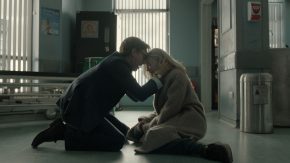Meantime is an early work by renowned filmmaker, Mike Leigh (Secrets & Lies, Vera Drake). This wonderful little television film made in 1983 deals with the early-life crisis and unemployment issues dominating Margaret Thatcher’s Britain. Meantime is burningly relevant and gut wrenchingly powerful even in today’s climate. This lesser known piece in Leigh’s rich body of work definitely deserves to be seen time and time again.
~ by Dora Endre ~
The movie focuses on the Pollock family living in a downtrodden neighbourhood of London. The family struggles to stay afloat during the “dark times” of Thatcher’s premiership. Massive blocks of flats, rust eaten playgrounds, siblings sharing a tiny crumbling bedroom. Movies made by the illustrious auteur usually focus on working class people. The Pollocks can only dream about becoming a real working class family. Unemployment spreads around the neighbourhood – and much of ‘80s Britain – like a disease. Meantime is an indirectly political movie with thick layers of solitude and silenced ambition. Only Mavis, the mother (Pam Ferris) has a steady job, making her the breadwinner in the family. Frank, the father (Jeffrey Robert) as well as his two sons are permanently unemployed. Mr. Pollock is stuck in a loop of self-pity, depression and suppressed anger against the system and himself. He lost his gender typical, patriarchal role and prestige in his own family. He is hurt and is hurting.
Income and every day, social struggle serve as the basis of separation and deteriorating relations. In an early scene, the Pollocks pay a visit to Aunt Barbara (Marion Bailey) and uncle John (Alfred Molina). The latter live in a well-to-do neighbourhood, in a comfortable, shiny apartment. The scene runs at the pace of a race car with rapid-fire dialogue, biting humour and a sense of harrowing disconnect among characters. These two families seem to be from different planets.
Meantime has a stellar cast with all actors bringing three dimensional, nuanced characters to the small screen. When Aunt Barbara (Marion Bailey) offers a minor job to the extremely timid and socially awkward brother Colin, it evokes much jealousy in his brother. The arch of the brotherly relationship between Colin and Mark is extraordinary. Tim Roth admittedly based the shy, faint-hearted younger brother on a former classmate. His argumentative, rebellious elder brother Mark is brilliantly portrayed by Phil Daniels. The constant poking and bullying between the two, show the usual colours of complicated brotherhoods, which slowly morph into a real comradery based on loyalty and love. They might compete with each other but also protect and nurture one another. Eventually, Colin grows into a man who is able to speak up for himself. And the brothers share a wonderful bonding scene late in the film. They must stick together and become true allies in order to survive.
Here, in his first film appearance, Gary Oldman plays Coxy, the Pollock brothers’ punk-skinhead “mate”. His character embodies the suppressed frustration, anarchism and pennilessness that characterised many young adults back then as well as today. He drinks, uses drugs, turns violent and psychotic against men and women. “Aren’t we mates?” is Coxy’s recurring question to others. He keeps on asking it with a twinkle of hope and profound sadness in his eyes. Eventually, in his loneliness and aimlessness he spirals down. He has nowhere to go. He has no shelter to run to.

Most characters of the movie suffer from paralysing loneliness. They are unable to communicate with honesty, thus to connect – which is one of the most prominent themes Leigh enjoys exploring in his work. The wealthy aunt cannot connect neither with her sister nor with her own husband. With her husband, John (Alfred Molina), they cover their unhappy marriage with their financial superiority. Independently from their social status, they are isolated and disconnected as well. Money does not resolve problems. Masking only makes them graver.
The couple has a powerful scene of unveiling. Barbara sits in the corner of a half-renovated room, boozing and weeping when John arrives home from work. She tries to open up, ready to provoke a fight in order to bring problems to the surface. However, no conflict erupts as John decides to ignore her wife and focus on her empty stomach instead.

Leigh freezes his characters in their own misery. They are wasting their own lives and each other. Without proper love and support, nobody is able to grow and start moving. The criterion of great art is that it loses none of its significance by the passing decades, and Meantime checks that box firmly. It still has the power to shake us and make us ask questions from ourselves about our ambitions, purposes and rapports.
Currently you can watch Meantime streaming on Criterion Channel.


























Comments